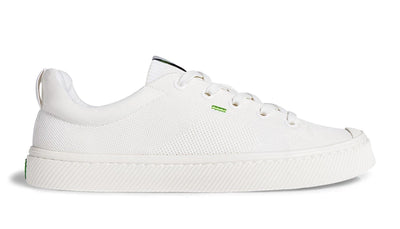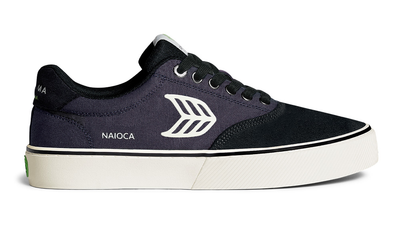Understanding the Environmental Impacts of Our Supply Chain Management
At Cariuma, we recognize that our commitment to sustainability goes beyond just producing high-quality footwear; it lies at the very core of our supply chain management. As one of the growing brands in eco-friendly fashion, we are continuously evolving our practices to ensure that our operations have a positive impact on our planet. Through sustainable sourcing, innovative materials, and ethical production methods, we strive to set a benchmark for sustainable footwear while minimizing our ecological footprint. Join us as we delve into the environmental impacts of our supply chain management and highlight how they contribute to a greener future.
Sustainable Sourcing: A Foundation for Environmental Integrity
One of the key pillars of our sustainable operations is our focus on sustainable sourcing. Each step of our material selection process is designed to reduce environmental harm and promote social responsibility. We partner with suppliers who share our vision for sustainability and implement eco-friendly practices in their operations.
- Natural and Regenerative Materials: Our commitment to using sustainable resources means incorporating materials like organic cotton, responsibly sourced leather, and recycled plastics. These materials ensure minimal environmental degradation.
- Transparency in Sourcing: We prioritize partnerships that are transparent about their sourcing practices, providing us with the confidence that our materials are ethically harvested and produced.
By emphasizing sustainable sourcing in our supply chain management, we reduce our reliance on harmful resources and ensure that our products reflect our values.
Eco-Innovation in Production Processes
Our dedication to sustainability extends into our production processes, where we harness eco-innovation to reduce waste and energy consumption. We continually seek ways to improve and innovate, which includes:
- Efficient Manufacturing: We work closely with our manufacturers to establish efficient production lines that minimize waste generation.
- Low-Impact Techniques: Utilizing low-impact techniques, such as water-efficient dyeing processes, helps us significantly reduce water usage and pollution.
The Power of Ethical Production
We believe that how we make our products is just as essential as the materials we use. Our ethical production practices not only benefit the environment but also contribute to the welfare of the communities involved.
- Fair Labor Practices: We ensure that all workers in our manufacturing supply chain are treated fairly, with safe working conditions and fair wages.
- Community Engagement: We engage with local communities for workforce development and training, producing a direct economic benefit to the regions where we operate.
Our commitment to ethical production reflects our broader philosophy of combining quality with responsibility, building a lasting relationship between sustainable practices and consumer trust.
Sustainable Logistics: Lessening Our Carbon Footprint
Logistics plays a crucial role in reducing the environmental impact of our supply chain. We believe that responsible transportation can significantly decrease our overall carbon footprint. Here are some methods we utilize:
- Optimized Transportation Routes: By planning efficient delivery routes and using eco-friendly transportation options, we lower carbon emissions associated with shipping.
- Local Warehousing: Establishing local warehouses close to our primary markets reduces the distance goods travel, further minimizing our environmental impact.
| Logistics Strategy | Environmental Impact |
|---|---|
| Efficient delivery routing | Reduced carbon emissions |
| Local warehousing | Shorter transportation distances |
| Eco-friendly transportation methods | Lowered reliance on fossil fuels |
Through these strategies, we not only demonstrate our commitment to sustainability but also illustrate the importance of innovation in logistics management.
The Role of Recycling and Waste Management
Waste management is a critical component of our sustainable supply chain. We are focused on minimizing our waste production through effective recycling initiatives and responsible disposal methods. Here’s how we approach this aspect:
- Recycling End-of-Life Products: We encourage our customers to send back worn-out shoes for recycling, allowing us to repurpose materials and reduce landfill waste.
- Reducing Packaging Waste: Our packaging materials are designed to be minimal, recyclable, and biodegradable, contributing to a substantial reduction in overall waste generated by our products.
By addressing these waste management issues, we reinforce our commitment to sustainability while promoting a circular economy.
Assessing the Impact: Measuring Sustainability
To truly understand the effects of our supply chain management, we assess our sustainability initiatives regularly. This allows us to recognize areas of improvement while celebrating our achievements.
- Carbon Footprint Tracking: We measure and track our greenhouse gas emissions, enabling us to actively seek reductions in our operations.
- Resource Usage Monitoring: By analyzing our energy and water usage, we can implement changes that promote efficiency and conservation.
Our ongoing evaluation process ensures that we remain accountable for our impact on the environment, demonstrating a commitment to continuous improvement.
The Consumer’s Role in Sustainable Fashion
We acknowledge that sustainability is a shared responsibility, and our consumers play a pivotal role in this journey. By choosing to support brands like ours, customers can make a significant impact.
- Educating Consumers: We strive to facilitate awareness through storytelling about our sustainable practices, encouraging conscious decision-making among our customers.
- Promoting Mindful Consumption: We recommend consumers invest in quality footwear that lasts longer and supports sustainability, significantly influencing market demand for eco-friendly products.
Your choices matter! By opting for sustainable brands, you are driving a change towards responsible fashion, reinforcing the positive environmental impact across the industry.
Bridging Goals with Action
Sustainability is not just a goal—it’s an action plan that involves everyone in the community, including us as a brand and you as an informed consumer. Our supply chain management focuses on forming partnerships that emphasize sustainability alongside profitability.
- Collaboration with NGOs: Partnering with environmental organizations enables us to contribute to larger strategic goals for ecological restoration and community development.
- Continual Learning: We engage in ongoing research and training, adapting our supply chain practices based on feedback and innovation trends.
At Cariuma, we are dedicated to scaling the impact of our sustainability efforts through actionable steps, showcasing our commitment to fostering a better world.
A Future of Sustainable Footwear
As we reflect on our journey in sustainable supply chain management, we envision a future where our practices make a significant difference in the fashion industry. With our innovative footwear designs, such as The OCA Low Leather Sneakers and Salvas Leather Women, we strive to provide our customers with stylish options that align with their values.
Our products aim to inspire people to make responsible choices without sacrificing style. We understand that the market is evolving, and we are here to lead the way with sustainable footwear that reflects our collective values.
Stay connected with the latest in sustainable fashion and explore our full collection at Cariuma. Together, we can walk towards a more conscious and sustainable future, one step at a time.















































